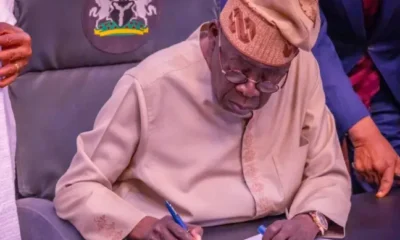Business
Conflict of Interest, disputes plague planned PIA review

Nigeria’s plan to amend its landmark Petroleum Industry Act (PIA) has sparked concern across the oil and gas industry, with industry lawyers, analysts, and investors warning that the proposal could erode governance reforms, hurt production contracts, and trigger costly disputes.
At the heart of the controversy is a proposed amendment, flagged by Oilprice and Reuters, which will transfer concessionaire powers and regulatory authority from the Nigerian National Petroleum Company (NNPC) Limited to the Nigerian Upstream Petroleum Regulatory Commission (NUPRC).
While the federal government has defended the move as a way to tighten oversight and reduce fiscal leakages, experts argue that it risks creating a dangerous conflict of interest by blurring the line between regulators and commercial actors.
Regulatory role vs. commercial powers
Under the current PIA framework, enacted in 2021 after decades of delays, the NUPRC was designed to function as an impartial regulator. Its responsibilities include approving field development plans, monitoring project costs, enforcing obligations, and punishing companies that fail to comply with industry rules.
If the amendment is passed, however, the NUPRC would also become the concessionaire, the entity that holds petroleum licences and contracts with international oil companies (IOCs) and local operators. That dual role, critics say, is a recipe for conflict.
“While the government has a fair argument that this amendment will help curb fiscal leakages, there are concerns about how this may be a conflict of interest,” said Ayodele Oni, partner at Bloomfield Law Practice. “Globally, the model that works is a clear separation of roles, where regulators face strictly regulatory functions. Making NUPRC a concessionaire could turn it into both referee and player.”
Oni warned that if NUPRC is allowed to enforce sanctions while also pursuing commercial returns, its neutrality would be compromised.
“This is a classic conflict of interest scenario. If NUPRC enforces a sanction that reduces commercial value, it would be hurting itself as a concessionaire. That undermines institutional independence and complicates accountability,” he explained.
Threats to existing contracts
Industry lawyers caution that the amendment could also unsettle existing Production Sharing Contracts (PSCs) and Joint Venture (JV) agreements—two contractual models that form the backbone of Nigeria’s upstream sector.
Currently, PSCs, dominant in deepwater fields, account for about 43 percent of Nigeria’s crude oil output, while JVs contribute another 30 percent – though they have struggled with funding constraints.
“These contracts were signed with NNPC as the counterparty. Amending concessionaire rights and transferring them to NUPRC without contractors’ consent could create legal gray areas,” Oni noted. “This could trigger litigation or arbitration, as contractors test whether statutory change can override contractual rights.”
Such disputes would not only create legal costs but also delay investment decisions in a sector already grappling with production declines.
Babajimi Ayorinde, a partner and energy law expert at TNP, expressed similar concerns.
“The proposed bill seeks to substitute the upstream regulator, NUPRC, for the NNPC in all subsisting upstream contractual arrangements, including PSCs and JVs. Regulators should ideally not be participants in markets they regulate. Their participation creates a conflict of interest and also distorts competition,” he said.
Ayorinde pointed out practical complications.
“Take the PSCs, for example. Under the current arrangement, the regulator issues enabling licences to the NNPC, who then enters into PSCs with contractors. If the bill is passed in its present state, it would create an awkward situation where the regulator will essentially issue licences to itself. Will the regulator sanction itself if licence terms and conditions are not observed?”
Operational and governance risks
Industry stakeholders also warn that the amendment could slow down decision-making in capital-intensive projects that require clear, commercially minded partners.
“JVs depend on clearly defined roles for funding and dispute resolution. If NUPRC takes on commercial duties without being capitalised or structured as a commercial actor, operators may face delays that stall drilling and development,” Oni cautioned.
Such delays could be particularly damaging at a time Nigeria is already struggling to meet its OPEC production quota of 1.5 million barrels per day (bpd). According to OPEC’s secondary sources, the country averaged 1.434 million bpd in August 2025, underscoring a persistent gap that threatens government revenue and foreign exchange (FX) earnings.
Jide Pratt, chief operating officer of AIONA and country manager of TradeGrid, said the proposal undermines the governance reforms that the PIA was meant to enshrine.
“The move to take commercial responsibility and ownership from the NNPC and place it with the NUPRC is an aberration. The regulator should have no commercial responsibility. Contracts should not reside with a regulator as it is counterproductive,” Pratt argued.
He added that a more effective path would be to expand private-sector participation in JVs, with NNPC maintaining a stake rather than transferring roles to the regulator.
“Ideally, more private-sector participants should buy out part of the JVs, with NNPC still holding a stake. I do think it is ill-advised, and if it happens, then it further depletes governance, which was part of the aims of the PIA,” Pratt said.
Investor sentiment at risk
The amendment comes at a delicate moment for Nigeria’s oil and gas sector, as global majors such as Shell, ExxonMobil, and TotalEnergies scale back local investments. Security challenges in the Niger Delta, regulatory disputes, and the global push for decarbonisation have already dampened enthusiasm for new upstream spending in Africa’s largest oil producer.
Analysts warn that reassigning concessionaire roles from NNPC to NUPRC could further erode investor confidence.
“Investors prize legal certainty and clear counterparties. Reassigning concessionaire roles without robust transitional rules and governance safeguards may slow financing, delay licensing rounds, and undermine confidence in Nigeria’s petroleum framework,” Oni said.
He argued that if the government insists on pushing through the amendment, it must introduce strong safeguards. These include transitional frameworks for contract novation and consent, governance structures to separate NUPRC’s regulatory and commercial functions, and independent oversight to prevent regulatory capture.
“If managed well, the reform could help reduce manipulation and improve revenue. If mishandled, it risks destabilising long-standing contracts, triggering disputes, and further discouraging investment,” Oni warned.
The bigger picture
Supporters of the amendment contend that Nigeria needs to curb fiscal leakages and reduce the inefficiencies associated with NNPC’s role as concessionaire. For years, critics have accused the state oil company of opacity, political interference, and financial mismanagement.
However, experts argue that replacing NNPC with NUPRC risks solving one problem by creating another. By blurring the lines between regulator and market participant, Nigeria could undermine the credibility of its petroleum governance system at a time it needs to attract billions of dollars in new investment to revive output.
“The management committee in every PSC is saddled with the responsibility of taking incremental investment decisions. I think such decisions are better left to businessmen rather than a regulator made up of civil servants,” Ayorinde stressed.
“The primary role of a regulator is to protect the public from the excesses of market participants. I don’t think the NUPRC will be able to carry out this responsibility effectively if it becomes a market participant.” (BusinessDay)
-

 News20 hours ago
News20 hours agoUmrah Suffers Setback As Airlines Suspend Flights To S/Arabia
-

 Politics21 hours ago
Politics21 hours agoAtiku’s son resigns from Fintiri’s cabinet
-

 News20 hours ago
News20 hours agoMajor, 3 Soldiers, Hunter Killed In Borno
-

 News21 hours ago
News21 hours agoRevised Executive Order: FG adjusts oil revenue remittance framework
-

 Politics20 hours ago
Politics20 hours agoDSS arrests social media user who ‘threatened’ Peter Obi after Edo attack
-

 News21 hours ago
News21 hours agoPolice Council Confirms Disu As IG, To Be Sworn In Wednesday
-

 Business20 hours ago
Business20 hours agoPrivate jet flight from Riyadh to Europe now cost N479m as elites flee Middle East tensions – Report
-

 News20 hours ago
News20 hours agoVigilante, Wife, 12 Others Abducted In Kaduna


















